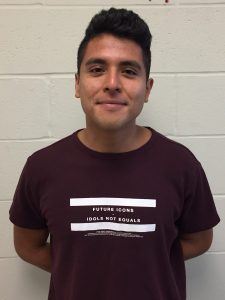 Victor Jacome has volunteered at a nursing home where he helps care for elderly patients in the acute care hospital center. A native of Wallingford, CT, this nursing major graduated from Lyman Hall High School. During high school he had the opportunity to travel to Beijing, Xian, and Shanghai.
Victor Jacome has volunteered at a nursing home where he helps care for elderly patients in the acute care hospital center. A native of Wallingford, CT, this nursing major graduated from Lyman Hall High School. During high school he had the opportunity to travel to Beijing, Xian, and Shanghai.
Student News
2018 Rowe Scholar: Gabriela Davila
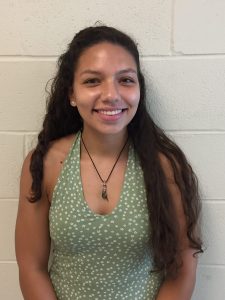 Gabriela Davila is a person who loves motion. She grew up playing volleyball and swimming, and loves going to the beach and traveling. She enjoyed her internship at Norwalk Hospital in the neonatal intensive care unit, pediatrics, and maternal fetal medicine because of how fast paced and energetic the departments were. A native of Norwalk, CT and a graduate of Norwalk High School, Gabriela is a nursing major and Spanish minor who hopes to be a neonatal nurse practitioner due to her interests in maternal fetal medicine and neonatal care.
Gabriela Davila is a person who loves motion. She grew up playing volleyball and swimming, and loves going to the beach and traveling. She enjoyed her internship at Norwalk Hospital in the neonatal intensive care unit, pediatrics, and maternal fetal medicine because of how fast paced and energetic the departments were. A native of Norwalk, CT and a graduate of Norwalk High School, Gabriela is a nursing major and Spanish minor who hopes to be a neonatal nurse practitioner due to her interests in maternal fetal medicine and neonatal care.
2018 Rowe Scholar: Ashley Balfour
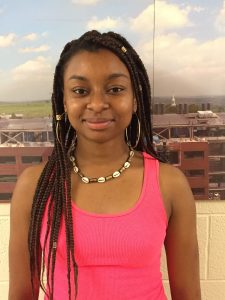 Ashley Balfour, from Windsor, CT, is an accomplished dancer. She’s been dancing since the age of three and is trained in ballet, jazz, hip hop, and contemporary. Whether it’s a softer, elegant style or a sharp and edgy style, she loves being able to transfer her emotions into a story using dance. A graduate of East Catholic High School, Ashley is a nursing major. She’s been influenced by her elementary school nurse and audiologists who have advocated for her own health and success. She’s currently interested in a variety of areas of nursing, from Zika virus research to medical spas. Ashley works for a nurse practitioner at a medical spa and has seen life changing results for patients who improve their self-image, self-esteem, and quality of life.
Ashley Balfour, from Windsor, CT, is an accomplished dancer. She’s been dancing since the age of three and is trained in ballet, jazz, hip hop, and contemporary. Whether it’s a softer, elegant style or a sharp and edgy style, she loves being able to transfer her emotions into a story using dance. A graduate of East Catholic High School, Ashley is a nursing major. She’s been influenced by her elementary school nurse and audiologists who have advocated for her own health and success. She’s currently interested in a variety of areas of nursing, from Zika virus research to medical spas. Ashley works for a nurse practitioner at a medical spa and has seen life changing results for patients who improve their self-image, self-esteem, and quality of life.
2018 Rowe Scholar: Elise Wardell
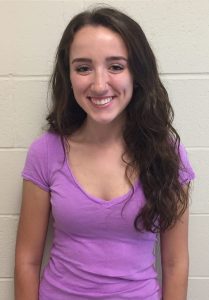 Elise Wardell is an allied health sciences major on a pre-physician assistant track. She has shadowed a pediatric PA in both a hospital and a doctor’s office and enjoyed experiencing the different settings. She has also volunteered at her local emergency department, where she got to see something new every time she was there. Elise is from Shelton, CT and graduated from Shelton High School, but loves traveling to her family’s house in Spain and hopes to do more travel in the future.
Elise Wardell is an allied health sciences major on a pre-physician assistant track. She has shadowed a pediatric PA in both a hospital and a doctor’s office and enjoyed experiencing the different settings. She has also volunteered at her local emergency department, where she got to see something new every time she was there. Elise is from Shelton, CT and graduated from Shelton High School, but loves traveling to her family’s house in Spain and hopes to do more travel in the future.
2018 Rowe Scholar: Hanya Ouda
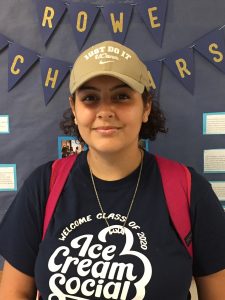 Hanya Ouda was born in Cairo, Egypt but currently lives in Coventry, CT. She’s a graduate of Connecticut International Baccalaureate Academy in East Hartford, CT. Hanya is a chemistry major on the pre-med track and has had the opportunity to shadow at a hospital for two years, once with the High School Student Research Apprentice Program and once with her pediatrician. These experiences exposed her to different fields in medicine as well as the importance of patient care.
Hanya Ouda was born in Cairo, Egypt but currently lives in Coventry, CT. She’s a graduate of Connecticut International Baccalaureate Academy in East Hartford, CT. Hanya is a chemistry major on the pre-med track and has had the opportunity to shadow at a hospital for two years, once with the High School Student Research Apprentice Program and once with her pediatrician. These experiences exposed her to different fields in medicine as well as the importance of patient care.
2018 Rowe Scholar: Neco McFadden
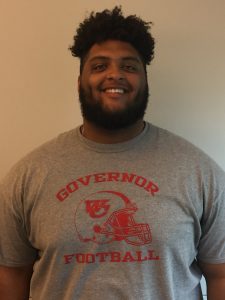 Neco McFadden is from New Haven, CT and graduated from Wilbur Cross High School. His interests lie in athletic training and nutrition. He’s inspired by his high school athletic trainer and is eager to start learning more about the human body. Neco is a good strength trainer and someday wants to compete. He also sees himself potentially becoming a strength coach.
Neco McFadden is from New Haven, CT and graduated from Wilbur Cross High School. His interests lie in athletic training and nutrition. He’s inspired by his high school athletic trainer and is eager to start learning more about the human body. Neco is a good strength trainer and someday wants to compete. He also sees himself potentially becoming a strength coach.
2018 Rowe Scholar: Camila Martinez
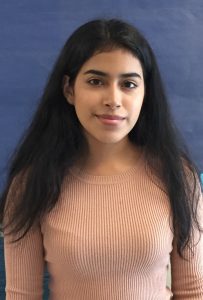 Irma “Camila” Martinez is an award-winning artist who enjoys taking art classes as a way to find balance in her schedule. She’ll be a molecular and cell biology major on the pre-med track at UConn, and hopes to get involved in research and clinical work. In high school she was a member of the medical club, which allowed her to learn about different medical roles, technology, and education. One of the club’s notable speakers was a cardiologist whose enthusiasm made her appreciate those who work in the medical field. Irma also found it to be an incredibly rewarding experience to shadow her aunt, an oral surgeon. Originally from Lima, Peru, Irma now lives in West Hartford, CT and graduated from Hall High School.
Irma “Camila” Martinez is an award-winning artist who enjoys taking art classes as a way to find balance in her schedule. She’ll be a molecular and cell biology major on the pre-med track at UConn, and hopes to get involved in research and clinical work. In high school she was a member of the medical club, which allowed her to learn about different medical roles, technology, and education. One of the club’s notable speakers was a cardiologist whose enthusiasm made her appreciate those who work in the medical field. Irma also found it to be an incredibly rewarding experience to shadow her aunt, an oral surgeon. Originally from Lima, Peru, Irma now lives in West Hartford, CT and graduated from Hall High School.
2018 Rowe Scholar: Andrew Hungerford
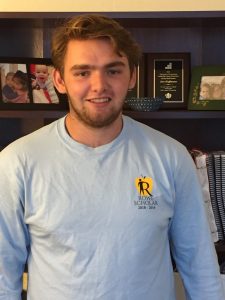 Andrew Hungerford is a biological sciences major with a particular interest in the nervous system. He has shadowed a surgeon at the Hospital of Central Connecticut, where he was able to see surgeries in person. A native of West Hartford, CT, Andrew graduated from Northwest Catholic. He loves to solve Rubik’s Cubes and the many variations that have come out since the original.
Andrew Hungerford is a biological sciences major with a particular interest in the nervous system. He has shadowed a surgeon at the Hospital of Central Connecticut, where he was able to see surgeries in person. A native of West Hartford, CT, Andrew graduated from Northwest Catholic. He loves to solve Rubik’s Cubes and the many variations that have come out since the original.
2018 Rowe Scholar: Ashlie Delskey
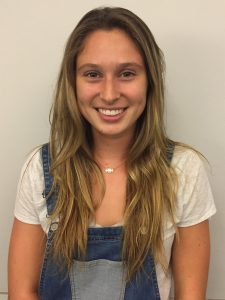 Ashlie Delskey hails from Somers, CT where she graduated from Somers High School. She enjoys running and playing lacrosse. A nursing major, she’s been inspired by her experiences shadowing a nurse practitioner and PA, who she says remained calm and friendly despite their high patient volume. She has also spent years watching her cousin’s pediatric team take care of him at Boston Children’s Hospital, and she notes that they’ve always been patient and kind.
Ashlie Delskey hails from Somers, CT where she graduated from Somers High School. She enjoys running and playing lacrosse. A nursing major, she’s been inspired by her experiences shadowing a nurse practitioner and PA, who she says remained calm and friendly despite their high patient volume. She has also spent years watching her cousin’s pediatric team take care of him at Boston Children’s Hospital, and she notes that they’ve always been patient and kind.
2018 Rowe Scholar: Erika deAndrade
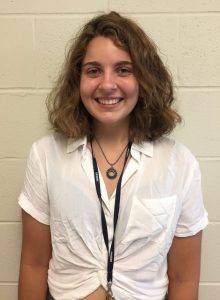 Erika deAndrade recently spent a summer gaining a great deal of experience with the Veterans Affairs (VA) system. At the Atlanta VA she shadowed and assisted different medical personnel, while at the Fayetteville VA she worked on the psych ward, taking notes, observing, and assisting mentally unstable veterans. At the VA Compensation Evaluation Center she observed and assisted with the documentation of veterans’ conditions post-service. Erika is from Ledyard, CT and graduated from Ledyard High School. She has a strong interest in science because she believes it helps us understand the world around us and that it’ll continue to be a pivotal subject of study in the future. She’s also very interested in the visual arts and ceramics. Another of Erika’s hobbies is travel and experiencing other cultures, which is made easier by the fact that her father’s a pilot and she flies for free.
Erika deAndrade recently spent a summer gaining a great deal of experience with the Veterans Affairs (VA) system. At the Atlanta VA she shadowed and assisted different medical personnel, while at the Fayetteville VA she worked on the psych ward, taking notes, observing, and assisting mentally unstable veterans. At the VA Compensation Evaluation Center she observed and assisted with the documentation of veterans’ conditions post-service. Erika is from Ledyard, CT and graduated from Ledyard High School. She has a strong interest in science because she believes it helps us understand the world around us and that it’ll continue to be a pivotal subject of study in the future. She’s also very interested in the visual arts and ceramics. Another of Erika’s hobbies is travel and experiencing other cultures, which is made easier by the fact that her father’s a pilot and she flies for free.